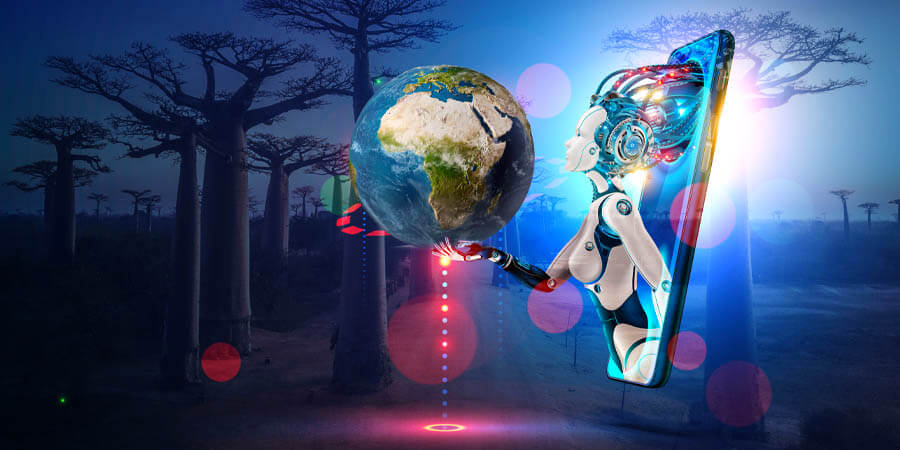Africa, a continent known for its rich cultural diversity and breathtaking landscapes, is stepping into the realm of artificial intelligence (AI) with innovative and exciting applications that promise to revolutionize various aspects of life. From wildlife conservation to education and entertainment, AI is making waves in Africa, enhancing experiences and paving the way for a brighter future.
Wild Interests
As Africa embraces the potential of AI, a surge of initiatives is underway to harness its vast potential. Google, for instance, has launched the Google for Startups Accelerator, aimed at supporting African startups utilizing AI to address local challenges. With a burgeoning population exceeding 1.4 billion mostly under the age of 30, the continent presents a ripe investment opportunity. Research highlights Africa's significant strides in AI, despite challenges in access to hardware, data, and talent. Over 30 AI developer communities and numerous universities offering AI programs across the continent demonstrate growing interest.
Additionally, Africa hosts over 2,400 AI organizations spanning various industries, from health to agriculture, indicating a thriving startup ecosystem. Africa is still catching up, particularly in mainstream fields like cloud computing where the presence of hyperscalers offering public cloud services remains limited throughout the continent, except in South Africa. For instance, Intron Health developed Africa's first speech-to-text AI chat tool capable of understanding 200 African accents; this tool significantly boosts clinical documentation processing speed for doctors. Meanwhile, Proteinea, an Egyptian company, leverages deep-learning models for rapid biotherapeutic medicine development. AI's potential in agriculture, mining, and banking sectors is substantial, with opportunities for optimizing yields, production, and the automating of customer transactions. However, understanding the return on investment for AI remains a challenge for many African enterprises. Regulation is seen as a crucial component in AI adoption, with concerns about data sovereignty and privacy.
A World of Fun and Creativity
AI is bringing new dimensions to entertainment in Africa. From virtual reality experiences to interactive storytelling, AI-driven applications are creating immersive and engaging content for audiences of all ages. Whether through gaming, film, or virtual tours, these experiences are reshaping the entertainment landscape.
In Africa, AI-driven technology is revolutionizing entertainment in diverse and exciting ways. AI-Powered Games introduce dynamic and interactive experiences, generating non-player characters with complex behaviors, and even designing entire game levels. Chatbots, infused with AI, engage users in amusing conversations, telling jokes and simulating interactions with fictional characters. AI algorithms in platforms like Google's DeepDream and AIVA create captivating art, music, and poetry, stimulating both visually and aurally.
Moreover, virtual assistants like Siri and Alexa, with their playful sense of humor, add a delightful touch to interactions. Social media platforms in Africa leverage AI-powered filters, turning ordinary moments into playful and creative experiences. Content recommendations from services like Netflix and Spotify, guided by AI algorithms, introduce users to new and exciting content tailored to their preferences. Additionally, AI models are trained to generate memes and humorous content, keeping the internet culture lively and engaging. In the realm of augmented and virtual reality, AI enhances experiences, creating immersive environments that redefine entertainment possibilities for users across the continent.
Considerations
The integration of AI in entertainment and technology brings a host of benefits, but it also raises important considerations. Privacy becomes a concern as AI systems rely on extensive data collection, prompting worries about its usage and protection. Job displacement is another potential consequence, with automation potentially reducing the need for certain roles. Ethical considerations arise due to the possibility of perpetuating biases present in training data, potentially leading to biased outcomes.
Dependence on technology may increase, potentially impacting human creativity and problem-solving skills. Also, security risks are heightened as AI systems become more integrated, necessitating robust cybersecurity measures. Over-reliance on AI for social interactions may reduce face-to-face human connections, potentially affecting social skills and emotional well-being. Unequal access to AI-powered technologies could lead to disparities in entertainment and educational opportunities. Finally, there's a risk of traditional skills losing emphasis with the advancement of AI, potentially resulting in a loss of expertise in those areas. Balancing these potential consequences requires careful consideration, ongoing research, regulation, and ethical guidelines.
AI is revolutionizing Africa and promising a brighter future, from wildlife conservation to education, healthcare, and entertainment. Collaboration on data handling is crucial, and thoughtful regulation is needed to avoid stifling innovation. This technological wave holds the promise of a brighter future for the continent, with boundless potential for positive impacts on communities and the environment for generations to come, provided there is continued innovation and investment. Ultimately, AI will augment jobs, create opportunities, and improve the quality of life across the continent and beyond.







